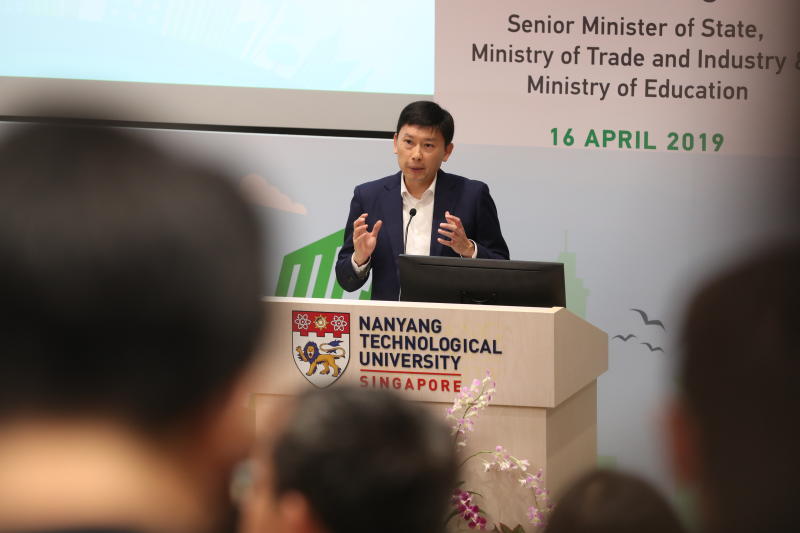First centre of innovation for energy sector will support SMEs and start-ups in clean energy projects
Sign up now: Get ST's newsletters delivered to your inbox

Senior Minister of State for Trade and Industry and Education Chee Hong Tat, who unveiled the centre in NTU on Tuesday (April 16), noted that the rising prevalence of digital technology and data science has unlocked new solutions and business models in the energy sector.
ST PHOTO: TIMOTHY DAVID
SINGAPORE - Small and medium-sized enterprises (SMEs) and start-ups working on clean energy projects can tap test beds, research and funding offered by the first centre of innovation for the energy sector.
The EcoLabs Centre of Innovation for Energy will help participating companies accelerate their green innovations and commercialise them for the market.
The country's ninth centre of innovation will work with corporate partners and investors to provide member companies with up to 30 public and private-sector test-bedding sites, ranging from high-tech lab facilities to specialised test centres, to pilot projects in a controlled environment.
EcoLabs is a collaboration between Nanyang Technological University (NTU), Enterprise Singapore and the Sustainable Energy Association of Singapore.
Senior Minister of State for Trade and Industry and Education Chee Hong Tat, who unveiled the centre in NTU on Tuesday (April 16), noted that the rising prevalence of digital technology and data science has unlocked new solutions and business models in the energy sector.
"We want Singapore companies to innovate and capture these new opportunities, but we recognise that not all companies, especially SMEs, have the scale or the resources to embark on this journey on their own. And this is where a collaboration like EcoLabs is useful," said Mr Chee.
"The initiative will provide test bedding so that companies can easily validate their innovations and skills, and build their track record if they want to internationalise. EcoLabs addresses a longstanding gap in the energy sector, and is going to plug this gap by bringing together partners from academia, industry and the government."
Since January, 18 SMEs and start-ups have joined the centre, with 14 corporate partners pledging to support the companies and further refine their clean energy ideas.
Within EcoLabs, NTU professors from various faculties such as material sciences and electrical engineering will also provide mentorship for the member companies.
V-Flow Tech, an SME that uses the more sustainable Vanadium redox batteries to power buildings and vehicles, and store electricity, is looking to work with a few start-ups and corporate partners within EcoLabs.
Its chief executive officer Avishek Kumar said the SME hopes to work with Involt - a company that specialises in supercapacitor technology - to incorporate supercapacitors within their batteries so that the batteries can charge electric vehicles faster.
Dr Avishek is also in talks with DNV GL - a corporate partner that provides risk management and quality assurance services - about reviewing the bankability of the Vanadium redox batteries and laying it out for commercialisation.
Similarly, Botsync, a start-up that invents mobile robots to inject automation into the manufacturing and logistics sectors, is hoping to work with another start-up to use wireless chargers for their robots.
Currently, the mobile robots have to dock at a charging station and the charging plate attached to it must touch the power plate at the station.
Sometimes, the robots fail to dock at the charging station properly and another sensor must be installed in the robot to fix it, said Mr Nikhil Venkatesh, co-founder of Botsync.
"Such glitches can be avoided and you can reduce your overall cost. By using wireless technology, there is an 8cm gap between the plate and robot, and it will still continue charging, and wireless technology is more energy-efficient."
Botsync is hoping to test the wireless charger invented by a product engineering company on its mobile robots.
One of the corporate partners, Continental, a German automotive manufacturing company, is hoping to work with start-ups and SMEs to co-create innovations in the fast-moving mobility industry.
"We want to be as agile and fast as the mobility industry. Since SMEs and start-ups are agile and tend to invent solutions quickly, we hope to work with them to co-create new products and solutions, and bring them into the market quickly," said Mr Lo Kien Foh, Continental's president and chief executive officer.
Continental will also use its venture arm to invest in promising companies, provide platforms to test the inventions and help to commercialise products.
EcoLabs will be housed in NTU.


